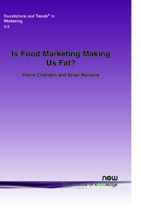Is Food Marketing Making Us Fat? A Multi-Disciplinary Review
By Pierre Chandon, Professor of Marketing, INSEAD, Boulevard de Constance, FRANCE, pierre.chandon@insead.edu | Brian Wansink, John S. Dyson Professor of Marketing, Cornell University, USA, wansink@cornell.edu
Abstract
Whereas everyone recognizes that increasing obesity rates worldwide are driven by a complex set of interrelated factors, the marketing actions of the food industry are often singled out as one of the main culprits. But how exactly is food marketing making us fat? To answer this question, we review evidence provided by studies in marketing, nutrition, psychology, economics, food science, and related disciplines that have examined the links between food marketing and energy intake but have remained largely disconnected. Starting with the most obtrusive and most studied marketing actions, we explain the multiple ways in which food prices (including temporary price promotions) and marketing communication (including branding and nutrition and health claims) influence consumption volume. We then study the effects of less conspicuous marketing actions which can have powerful effects on eating behavior without being noticed by consumers. We examine the effects on consumption of changes in the food's quality (including its composition, nutritional and sensory properties) and quantity (including the range, size and shape of the packages and portions in which it is available). Finally, we review the effects of the eating environment, including the availability, salience and convenience of food, the type, size and shape of serving containers, and the atmospherics of the purchase and consumption environment. We conclude with research and policy implications.
Is Food Marketing Making Us Fat? A Multi-Disciplinary Review
Is Food Marketing Making Us Fat? reviews the literature in marketing, nutrition, psychology, economics and related disciplines that investigate the link between marketing activity, food intake and obesity, with a particular emphasis on the effects of marketing on overeating. The authors bring together streams of research which have so far been largely disconnected. To limit the scope of the review, this monograph focuses on the direct effects of marketing activity under the direct control of food marketers and on consumption volume because of its direct impact on food/energy intake. It also reviews studies on food choice to the extent that it obviously impacts energy intake but exclude studies of the effects of marketing on energy expenditure.
